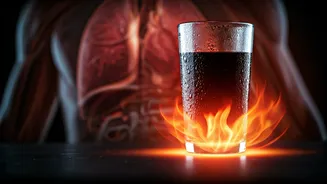Acidity's Beverage Triggers
Heartburn, that uncomfortable burning sensation in the chest, can be triggered by various factors, with certain beverages frequently being the cause. The
problem lies in how these drinks interact with the lower esophageal sphincter (LES), a muscle that prevents stomach acid from flowing back into the esophagus. Some beverages can relax the LES, allowing acid to escape, while others directly irritate the esophageal lining. This section will delve into six drinks that are commonly associated with heartburn, explaining why they pose a problem and the mechanisms through which they exacerbate symptoms. Being mindful of these triggers is the first step towards finding relief and managing this condition.
Coffee's Double Trouble
Coffee often tops the list of heartburn triggers for several reasons. Firstly, caffeine, a primary component of coffee, is known to relax the LES, paving the way for stomach acid to reflux. Secondly, coffee is naturally acidic, and consuming acidic substances can directly irritate the esophagus. This combination of effects makes coffee a potent trigger for heartburn. Individuals sensitive to coffee might find that even small amounts can cause symptoms, while others may experience problems only after consuming larger quantities. To manage this, consider switching to decaffeinated coffee, which reduces caffeine intake, or opting for milder roasts, which tend to have lower acidity levels. Understanding how coffee affects your body is essential for those struggling with heartburn.
Carbonated Drinks Impact
Carbonated beverages, including sodas and sparkling water, are another common source of heartburn symptoms. The carbonation, or the presence of carbon dioxide bubbles, increases pressure within the stomach. This increased pressure can push the LES, making acid reflux more likely. Furthermore, many carbonated drinks are also highly acidic, further irritating the esophageal lining. Artificial sweeteners, often found in diet sodas, can sometimes trigger similar reactions in certain individuals. This effect can be pronounced in people who consume large amounts of these drinks. If you're prone to heartburn, avoiding or reducing your intake of carbonated beverages could significantly improve your comfort. Choosing still water or unsweetened teas can serve as good alternatives to reduce acid reflux issues.
Alcohol's Irritating Effects
Alcoholic beverages, especially those high in alcohol content, often contribute to heartburn. Alcohol relaxes the LES, allowing stomach acid to flow back into the esophagus. Moreover, alcohol can irritate the stomach lining, leading to increased acid production. Different types of alcohol can have varying effects. For instance, red wine, due to its acidity and histamine content, and beer, which can sometimes cause gas and bloating, are common culprits. Hard liquors with higher alcohol percentages tend to exacerbate the problem. Moderate consumption may be acceptable for some, but those prone to heartburn should carefully monitor their alcohol intake and, possibly, avoid it altogether. Staying hydrated and eating before drinking can alleviate the effects of alcohol.
Citrus Juices' Acid Surge
Citrus juices, such as orange, grapefruit, and lemon juice, are known for their high acidity. This high acidity can directly irritate the esophageal lining, triggering heartburn symptoms. The pH level of these juices is typically very low, meaning they are very acidic. Consuming large quantities of citrus juice or drinking it on an empty stomach can intensify these effects. For those who enjoy the taste of citrus, diluting the juice with water can reduce the acidity, making it less likely to cause heartburn. Exploring lower-acid alternatives such as apple or pear juice can provide similar benefits with less risk of triggering acid reflux symptoms. Being aware of the acid content in your beverage choices is crucial for managing heartburn.
Tomato Juice Concerns
Tomato juice, while often considered a healthy beverage, can also be a significant trigger for heartburn in sensitive individuals. Tomatoes are naturally acidic, and this acidity can directly irritate the esophagus, resulting in acid reflux symptoms. Tomato-based products, like tomato juice and other preparations, have a pH that is sufficiently low to trigger heartburn. The impact of tomato juice can vary depending on the individual and the amount consumed. Some people find that even a small glass triggers discomfort, while others may be able to tolerate it without problems. For those who experience heartburn after drinking tomato juice, exploring non-acidic alternatives or eating tomatoes with other foods can help mitigate the effects and promote comfort.













